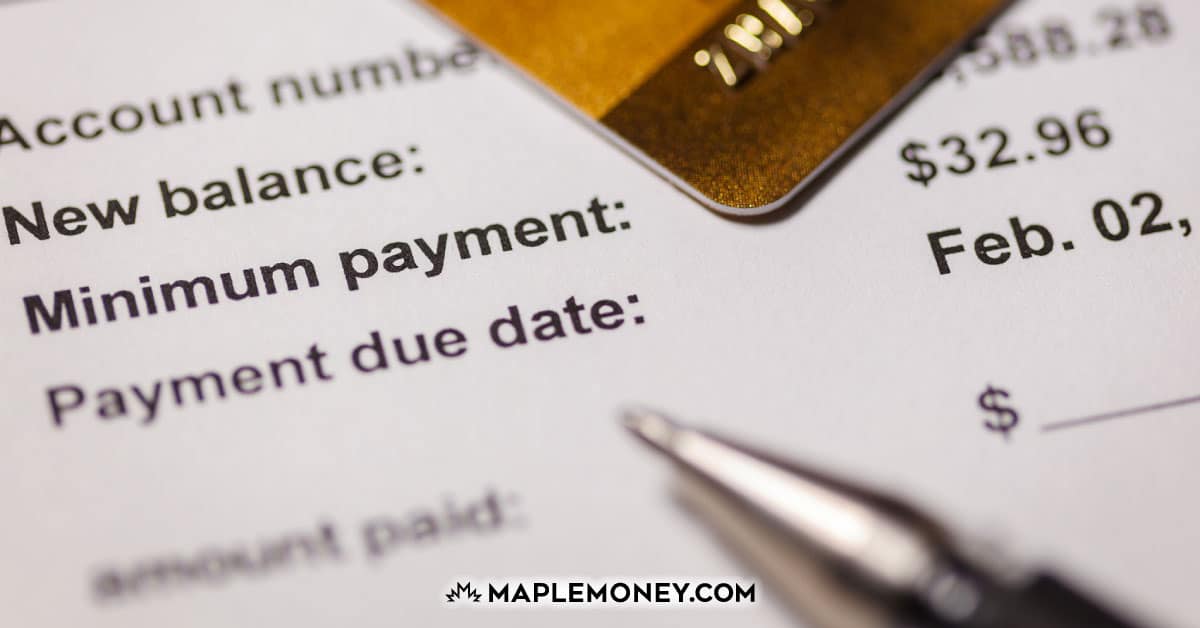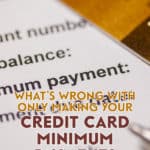What’s Wrong With Only Making Your Credit Card Minimum Payment?

Credit cards can come with many benefits, rewards points, and cashback. But carrying a credit card balance negates any of the advantages of credit cards. Getting a credit card, using it, and making the credit card minimum payment may feel like you are on the right path. But those minimum payments can end up costing you a lot of money in interest charges. Minimum payments are not to your benefit but to that of the credit card companies.
What Is a Credit Card Minimum Payment?
A credit card minimum payment is the minimum amount due to keep your credit card in good standing.
Keeping your credit card in good standing means that there are no late fees or interest charges, no loss of any credit card benefits or rewards, and no missed payment report on your credit report.
How Is the Minimum Payment Calculated?
Your credit card issuer will determine the calculation for your credit card minimum payment. Of course, things can’t be simple, so every issuer may have its way of calculating your minimum amount. Your credit card agreement lists the specifics for your credit card.
Remember all that fine print you read when you signed up for your credit card?
Typically, the minimum payment is a percent total of the balance, usually 1-3%, or $10, whichever is greater.
But some card issuers calculate the minimum payment as $10 plus the interest on your previous billing cycle.
Regardless of the calculation, the higher your credit card balance, the greater your minimum amount will be.
How to Find Your Minimum Payment Terms
As of September 2020, banks and other financial institutions are required to show an estimate of how long it will take to pay off your credit card balance if you only make the minimum payment. You will usually find this information near the minimum payment amount and date that it must be paid by.
If you get a monthly paper credit card statement/credit card bill, they should have a place that lists the minimum payment and when it is due.
If you get an electronic statement (credit card bill), you can sign in to your bank’s online portal to see the minimum payment terms.
Making a Credit Card Minimum Payment
Making a credit card minimum payment is easy. You can do this through your only banking portal. Or you can physically go into a branch to make the payment.
Most online banking portals will have an easy payment option for making the minimum payment. With just a few clicks of the mouse, you will be good to go.
What Happens if I Only Make the Minimum Payment?
Only making the minimum payment will help keep your credit card in good standing, but it is not wholly to your benefit. The minimum amount benefits the credit card companies in terms of more interest in their pockets.
The longer you take to pay off a credit card’s balance, the more interest you will pay.
Let’s Look at an Example
| Scenario 1 | Scenario 2 | |
| Credit Card Balance | $2500 | $2500 |
| Interest Rate | 19.99% | 19.99% |
| Minimum Payment | $75 | $75 |
| Extra Payment | $0 | $50 |
| Total Interest Paid | $2862.43 | $745.31 |
| Time to Debt Free | 16 years, 8 months | 3 years, 2 months |
The scenarios listed above assume that no more additional charges are added to the credit card balance.
That is key when trying to pay down your debt. Try to avoid adding any more debt.
In Scenario 1, making just the minimum payment will cost you over $2800 in interest charges. That is over double what the original credit card balance was. But paying an additional $50 a month can save you over $2100 in interest charges and more than 13 years of your time. Just that small extra amount made a significant impact. Imagine if you were able to pay more than $50 extra a month?
If you’re curious about the impact of extra credit card payments on your debt, the Government of Canada has a great calculator that you can play around with.
How Making the Minimum Payment Affects Your Credit Score
Making only the minimum payment can both negatively and positively affect your credit score.
First, making the payment has a positive effect on your payment history. This is a good thing as payment history is often the most significant influencer on your credit score.
But, only making the minimum payment can harm your credit utilization. Credit utilization is how much credit you have access to compared to how much of it you are currently using. The lower you can keep your credit card balance, the better your credit utilization will be and therefore credit score.
If you are only making the minimum payment, then chances are you are carrying a slightly higher balance on your credit card. Keeping a higher balance on your credit card will negatively affect your credit utilization and may decrease your credit score.
Tips for Paying off Credit Card Debt
Here are some tips to help you decrease all your credit card debt, to avoid any of the negative consequences of only making the credit card minimum payment
Use Your Credit Card Sparingly
Only charge what you can afford to pay that month.
Credit cards can have many advantages when it comes to benefits, cashback, or rewards points. But these advantages only make sense if you pay your card off in full every month. If this is a problem for you, then reduce the amount you use your credit card.
Be very selective on what purchases you choose to charge. Try to keep your balance as low as possible.
And if you already have credit card debt, try not to use your card at all if you can avoid it. The more you use your card, the higher the balance will be that you have to pay off eventually.
Ask for Help
Credit card companies don’t always tell their customers that you can often negotiate your interest rate. If you find yourself falling behind with your credit card, call up the credit card company and ask for help. They may be able to decrease your interest rate, and therefore your future payments. Or they may be able to help you come up with a payment plan that works for you.
Don’t be scared or embarrassed to make a phone call if you get behind. You have nothing to lose and everything to gain.
Use a Balance Transfer
Some credit cards offer low introductory rate balance transfers. You can transfer your credit card debt to these cards and may minimal (if any) interest for an initial period.
Balance transfers can be great tools at helping you to get a handle on your credit card debt and to pay it off faster. Just make sure to keep track of when the low rate introductory offer ends. Once it does, you will owe interest (at a higher rate) on the card’s balance.
Set a reminder on your phone a couple of weeks before the introductory offer expires. That will give you a couple of weeks to figure out the next step in your debt repayment plan. Setting a reminder also helps to ensure you don’t miss the critical deadline.
Look for Credit Cards With Lower Interest Rates
Not all credit card products have the same terms and conditions. While credit cards have some of the highest interest rates, there are still cards out there with single-digit interest rates.
Before you sign up for a credit card, shop around. Find the best product that fits your needs.
If you already have a credit card with a high-interest rate, you may consider negotiating a lower rate or transferring your balance to a lower interest rate card. The lower the interest rate, the less money you will pay when paying off your debt.
Make More Than the Minimum Payment
By now, hopefully, you can see that making the credit card minimum payment is not always in your best interest. Any extra you can put towards your credit card above the minimum amount can make a significant impact.
If you are paying off various types of debt, it is good to prioritize credit card debt first. Credit cards often have some of the highest interest rates, therefore, costing you the most in interest charges.
A good strategy is to write down all of your debts, including balances and interest rates. Then come up with a plan on which ones to prioritize.
Will you use the debt avalanche and pay the debt with the highest interest rate first? Or will you use the debt snowball and prioritize the debt with the lowest balance?
Play around with the credit card minimum payment calculator offered by the Government of Canada to see how much money you can save by paying more than just the minimum.
Using Credit Cards to Your Advantage
Credit cards can be a great tool. Personally, I have benefitted from tons of free travel thanks to my credit card travel rewards.
But don’t fall into the credit card minimum payment trap.
If you can, always try to pay more than the minimum. Even small amounts can go a long way to saving you in interest charges and years of paying off debt.
Use your credit card to your advantage, not to the benefit of the credit card companies. And the best way to only charge what you can afford to pay. Always make sure to pay your credit card balance in full every month.

